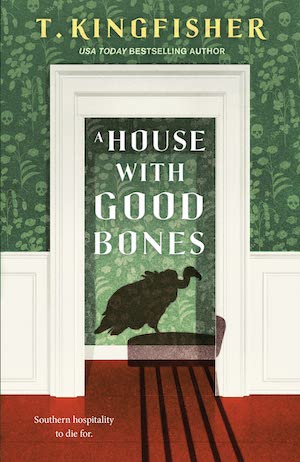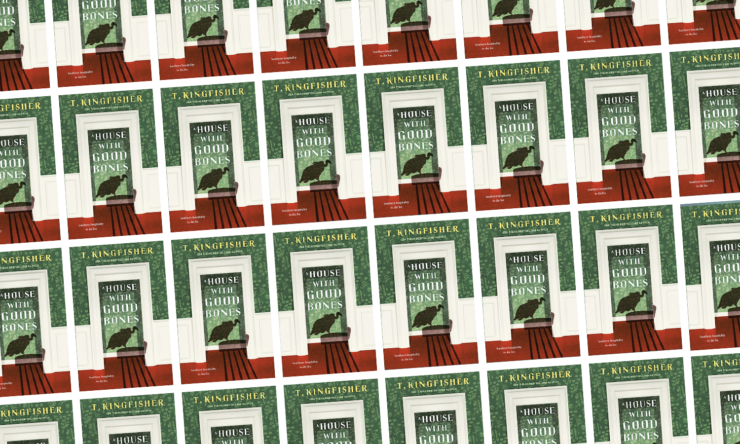What we grow on this earth leaves a legacy, for better or worse.
This is a thing Sam Montgomery thinks she understands. She’s a scientist—an archeoentomologist, to be exact, and she knows how to read history in the preserved husks of insects who found food and death within our ancestors’ leavings.
But when her brother calls her to check on their mother, Sam is confronted with a legacy she can’t rationalize—her family’s own. Sam always knew there was something a bit off about her grandmother. She and her mother loved Gran Mae in a common, tense sort of way, Sam’s mother serving as generational translator for either, pinching her lips at Mae’s casual white lady Southern racism but ensuring Sam and her brother knew she didn’t more than tacitly endorse it. Christian and fundamentally classist, Gran Mae had been a familiar archetype. She died eighteen years prior to the beginning of A House With Good Bones, which means Sam’s mother is officially the age that her own mother Gran Mae had been when she passed.
Buy the Book


A House With Good Bones
At first, Sam chalks up the strangeness on Lammergeier Lane to that simple fact. After all, she’s a scientist: She knows how to rationalize. All right, her mother has reinstated Mae’s Confederate art that she herself had removed when Mae died, bizarre given that said mother has been at anti-Confederate statue protests recently. Okay, there’s strange vultures hovering eerily around the property, that’s new, but Sam’s mom handwaves it as the quirk of a nearby neighbor. Unusual, but hey, grief is weird and complicated—which is true!
But the thing Sam quite explicitly cannot bring herself to explain away is the bugs. Or, more accurately, the stark lack thereof. She knows insects, and she knows her grandmother’s home. There are no mosquitos in the still air, no ants or gnats in the kitchen, no bees in the garden, and more than anything, this is what leads Sam to understand that something is deeply wrong.
From here, a dizzying adventure unfolds, as Sam struggles to understand the hidden history, dark power, and the quietly eldritch horror of her own gnarled family tree.
At its crux, A House With Good Bones is about those sorts of family trees in the American south. T. Kingfisher builds the story on the central tension of what might be known as “southern hospitality”: kindness without goodness, ill-gotten power, and violent, xenophobic insecurity. Something beautiful, flourishing, and ostensibly peaceful, built on the site of indefensible human horrors—a fitting emblem for white prosperity in the American south. It’s horror under the nose of an HOA, which is one of my favorite sorts of genre storytelling. Bend reality just a bit, make literal the monstrosity humans are capable, and you have a cautionary tale come to life—the uncanny, hovering phantom of what happens when you try to create a “nice and normal,” perfect child.
Sam never fit that description for a variety of reasons, not least of all that she’s fat, and Gran Mae’s biases include the familiar fatphobia engrained in capitalistic American whiteness. We don’t have an abundance of fat protagonists in genre fiction, and I love that Kingfisher has given us a fully realized fat girl scientist fighting real horrors and bigoted family members. She gets to be both thoroughly haunted and thoroughly loved, and—in a scene that made me “yeah!” aloud—she finds her ghostbusting impeded by the fact that whoever plans Hollywood stakeouts doesn’t account for how incompatible big tits are with lying on your stomach. Kingfisher balances this with a clever nod to the fact that fatphobia means if Sam sought any sort of help for her haunting, she’d be very likely to have her experiences dismissed by institutions as, somehow, symptoms of her fatness. And in this way Kingfisher hammers home that Gran Mae’s bigotry, like all bigotry, is not only irritatingly removed from reality, but life-threatening.
The setting is quite narrow, which feels effective for a work of this scope. Kingfisher builds out the atmosphere believably, integrating the deconstruction of a ritual magic system with trips to the Piggly Wiggly. Makes me feel like this sort of thing might be happening in Gran Mae’s houses all over the south.
This is a commercial-leaning, almost cozy-ish southern gothic in tone. I went into it hoping for a bigger twist—a heftier catharsis to earn the real-world trauma at its core—and I enjoy the lighter moments more when I reflect on them within the actual narrative as a whole on the page. The voice is humorous, parenthetical, and certainly distinctive; it will either work for you or it won’t. I didn’t quite connect, but that’s personal preference misalignment, not a flaw of craft. Relatedly, there’s a background romance that wasn’t entirely necessary for me, but might be a welcome addition for other readers. It’s light-handed and I like both characters enough to root for it. The short page count will also work for you or not, and it does feel complete—there’s just another way you could tell this story for a different audience. How do you parent an aging parent? How do you undo generational trauma woven into magic? And—how do you balance these heavy questions with a fairly light-hearted cozy gothic? At times the book felt like it wasn’t sure what it decided to be, though I allow that I may have just wanted a slightly different take and this will appeal to its readers. Still, the lighter tone and touch of romance felt inconsistent at times with a plot dealing so heavily in monstrous whiteness, voiced and written by a white person.
The book is most effective when it unapologetically leans into the grotesque truth of a land’s legacy, and the harm a single powerful person’s hatred can enact. This manifests in several ways throughout the plot, both interpersonal and supernatural. When you poison the soil you’re planted in, it doesn’t go away when you die. Don’t romanticize your racist, abusive, “complicated” ancestors, not when the wounds they cut into you and the world itself still bleed—or they will haunt you. Kingfisher confronts the toxic white Southern ideal of “nice and normal”: You have to take care of each other, not ignore, deny, or conceal when something’s wrong, even when it might be uncomfortable.
This means confronting your own reality. Recognizing that memory and morality can be shifting things, that what you once thought of as normal or inevitable was, in fact, extremely fucked up. Or that it’s both. To be haunted by your beloved, maybe-evil, racist dead grandma’s expectations. To love your family’s matriarch, and to fear her. As Sam reflects on her childhood with Gran Mae, she has to question everything. How terrifying, to realize the permeability of your own truth, to know the fallibility in the understanding of your own life.
I think it’s worth the mild spoiler of this single line, because it encapsulates Sam’s attitude toward the complicated care and disgust she has for her grandmother: “I could not pity the adult she had become, but I could pity the girl she had been.”
A House With Good Bones understands that generational haunting necessitates generational undoing. It gets into real horror, though due to that lighter tone, some of those moments hit as real scares, while some lean campy. Kingfisher is quite successful at building fun suspense—this book does get quite pleasurably creepy! It will work for readers who want genuine scares rooted in reality and surreality, delivered as a quick, accessible, voicey read.
A House With Good Bones is published by Nightfire.
Maya Gittelman is a queer Fil-Am and Jewish writer and poet. They have a short story forthcoming in the YA anthology Night of the Living Queers (Wednesday Books, 2023). She works in independent publishing, and is currently at work on a novel. Find them on Twitter (@mayagittelman) or Instagram (@bookshelfbymaya).











I just finished reading this rather unputdownable book. I loved it almost as much as The Twisted Ones –which is set in the same fictional(?) area of NC and even shares a café and a barista with this one.
I do find Ms. Gittelman’s specific criticisms a little puzzling. The wry humor and the treatment of the material is pure T. Kingfisher, as her readers will know and appreciate. I suppose the critic is not familiar with her other books? One cannot fault authors for being themselves.
Also, if such a barely-there insinuation of romance like the one in this book (and trust me, it’s barely there) bothers Ms. Gittelman so much, I’d suggest finding different, feelings-proof reading material, like, say, Gene Wolfe.
I really liked the book — and the narrator — and noted several scents and whiffs of The Case Of Charles Dexter Ward. Do not call up that which you cannot put down,,,